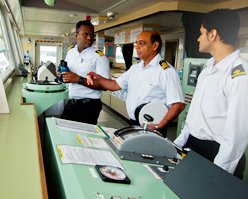How to Select the Right Merchant Navy Course for Your Career?
Body
There are a number of important factors to take into account while selecting the best Merchant Navy education for your future. First, determine what your interests and strong points are. For example, if you are interested in ship operations and navigation, nautical science courses can be a good fit for you. Examine the course offerings, reputation, and placement histories of other universities by conducting research on them. Make sure the length and content of the course correspond with your professional objectives. Verifying the institution's accreditation is also crucial because it affects your credentials. For further insights, talk to industry professionals or alumni. In the end, choosing a school that aligns with your goals and offers hands-on training is essential for success in the maritime sector.

Examining Courses at Merchant Navy Colleges
In order to train students for a diversity of professions in the marine industry, merchant navy institutions offer a wide range of merchant navy courses. These programs proposal the academic understanding and practical aids needed for a successful maritime profession. Choosing the appropriate institution and course is vital for those who need to become seafarers, as the demand for skilled workers in the shipping industry is increasing.
Courses Offered by the Merchant Navy
Courses in marine engineering and nautical science are amongst the most popular offerings from the Merchant Navy. Those by an interest in navigation, ship operations, and marine safety might pursue a diploma in nautical science. In order to prepare students for a future as a deck officer, this course usually contains instruction in navigational procedures, ship management, and safety standards.
Conversely, students interested in the technical features of ships are catered to by Graduate Marine Engineering degrees. Subjects containing engineering principles, maintenance approaches, and maritime machinery are covered in these programs. These courses equip graduates to work as marine engineers, who are in charge of operating and maintaining a container's machinery.

Admission Procedure and Application Form for the Merchant Navy
Applicants must complete the Merchant Navy Application Form, which normally requests information regarding educational background and physical health, in order to be considered for enrollment in any of the Merchant Navy colleges. Exams for admission, interviews, and background checks may be part of the application process. To prevent any problems during the admissions process, it is imperative that you acquire all required documentation and correctly fill out the application.
Considerations for Selecting a Merchant Navy College
A number of considerations should be examined when choosing an institution for Merchant Navy courses. Investigate the college's standing first, taking into account its accreditation and placement history. Better internship and employment chances may be offered by an institution with close ties to the business community. The facilities that are provided, such workshops, simulators, and knowledgeable instructors, should also be taken into account since they improve the quality of the learning process.
An additional crucial element is the curriculum. Make sure the course you select includes important themes pertinent to the maritime business and is in line with your professional ambitions. A big part of the curriculum should be practical training, which gives students real-world experience.










Comments